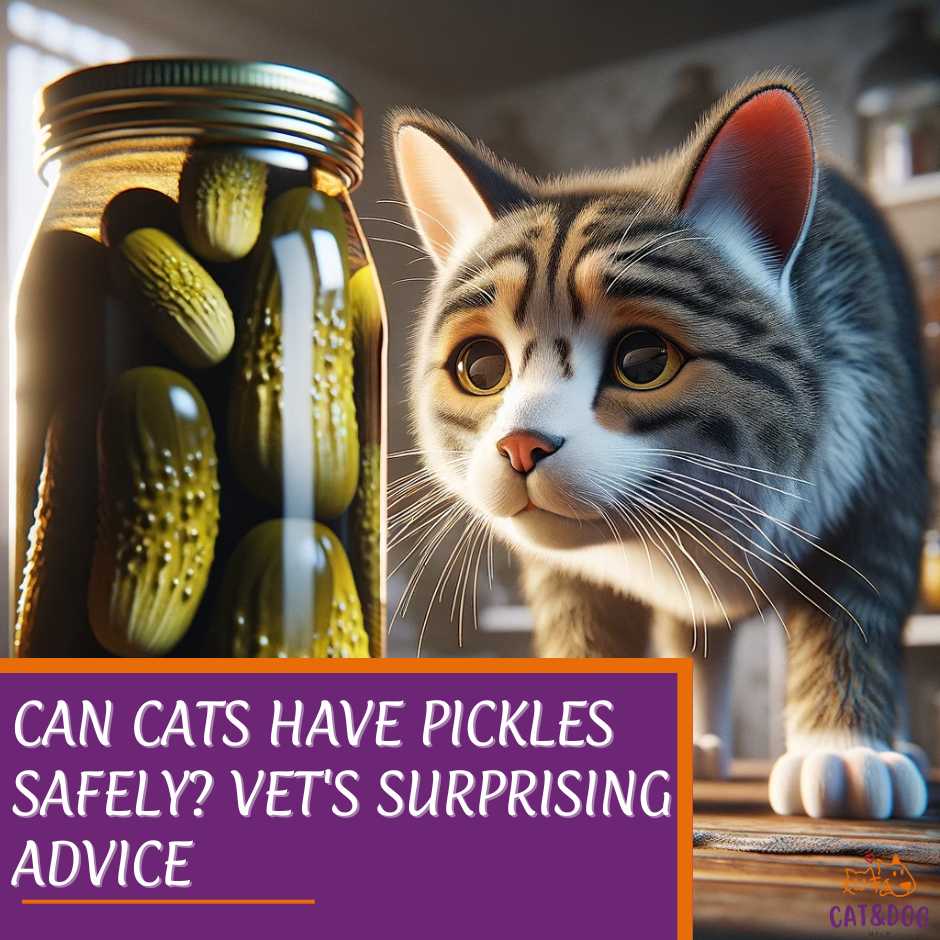Have you ever caught your feline friend eyeing a tangy pickle from your plate and wondered if it’s safe for them to have a nibble?
So, can cats have pickles?
Pickles are a snack enjoyed by many, but whether these briny bites are suitable for cats is a topic of curiosity and concern for many cat owners.
Your cat’s diet is essential to their health, so it’s crucial to understand what is and isn’t safe for them to consume, including the risks and precautions of a feline diet. (1)
Now that you know what you can safely feed your cat, it’s just as important to find a bowl that supports their health and well-being.
With whisker-friendly bowls and a wide tray to catch any spills, our Hepper NomNom Cat Bowl is our favorite option.
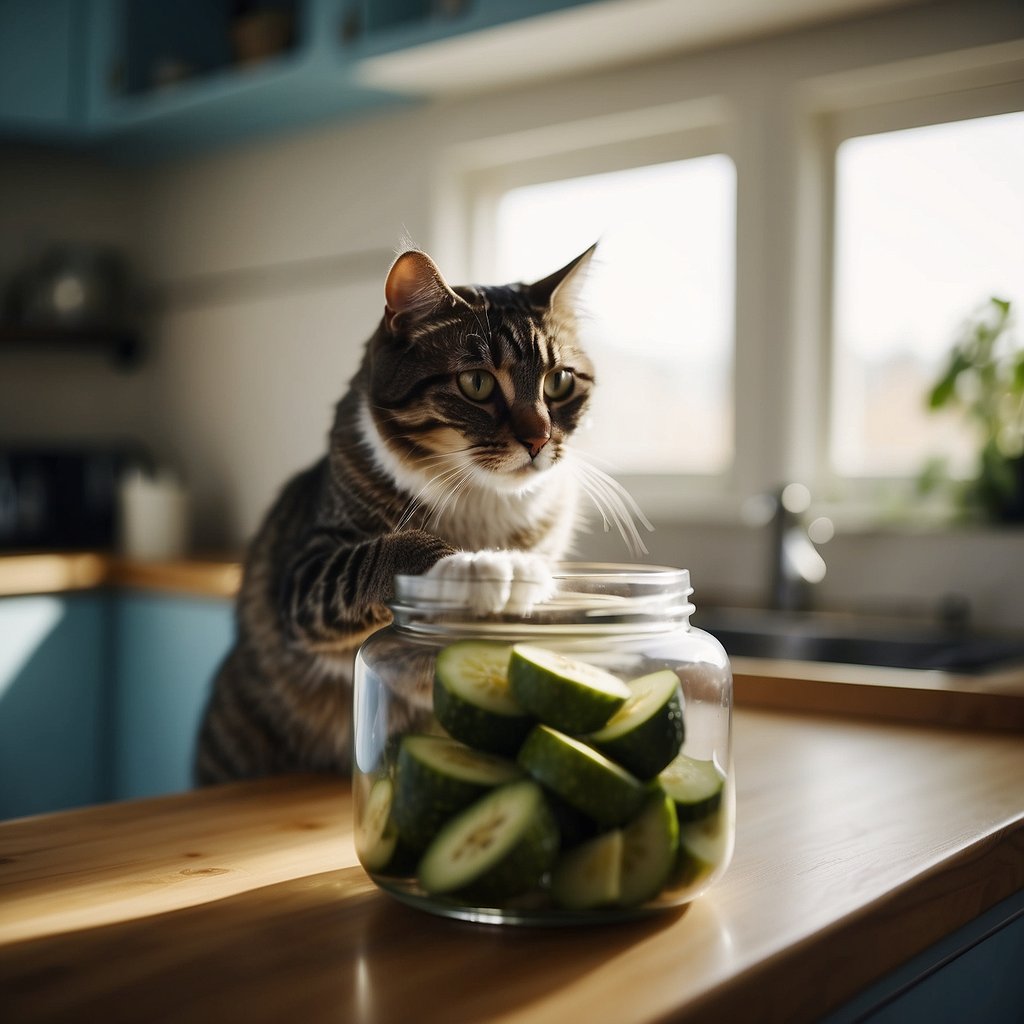
As a caring cat owner, you know that cats are obligate carnivores, meaning their natural diet consists mostly of meat, including animal protein. (2)
While the occasional human food can sometimes be a harmless treat, pickles raise a few red flags.
Understanding the nutritional considerations for our furry companions is important when exploring new snacks to share.
Let’s dive into whether pickles and cats mix, ensuring you’re armed with the facts to keep your kitty healthy and happy.
However, the short answer is that high-quality cat food, not pickles or other non-animal protein sources, is all your cat needs for a healthy cat’s diet.
Key Takeaways
- Pickles contain ingredients that are not recommended for feline consumption.
- Cats have different nutritional needs from humans, and certain human foods can be harmful to them.
- Cat owners need to be informed about safe dietary practices for their pets. (3)
Nutritional Considerations for Cats and Pickles
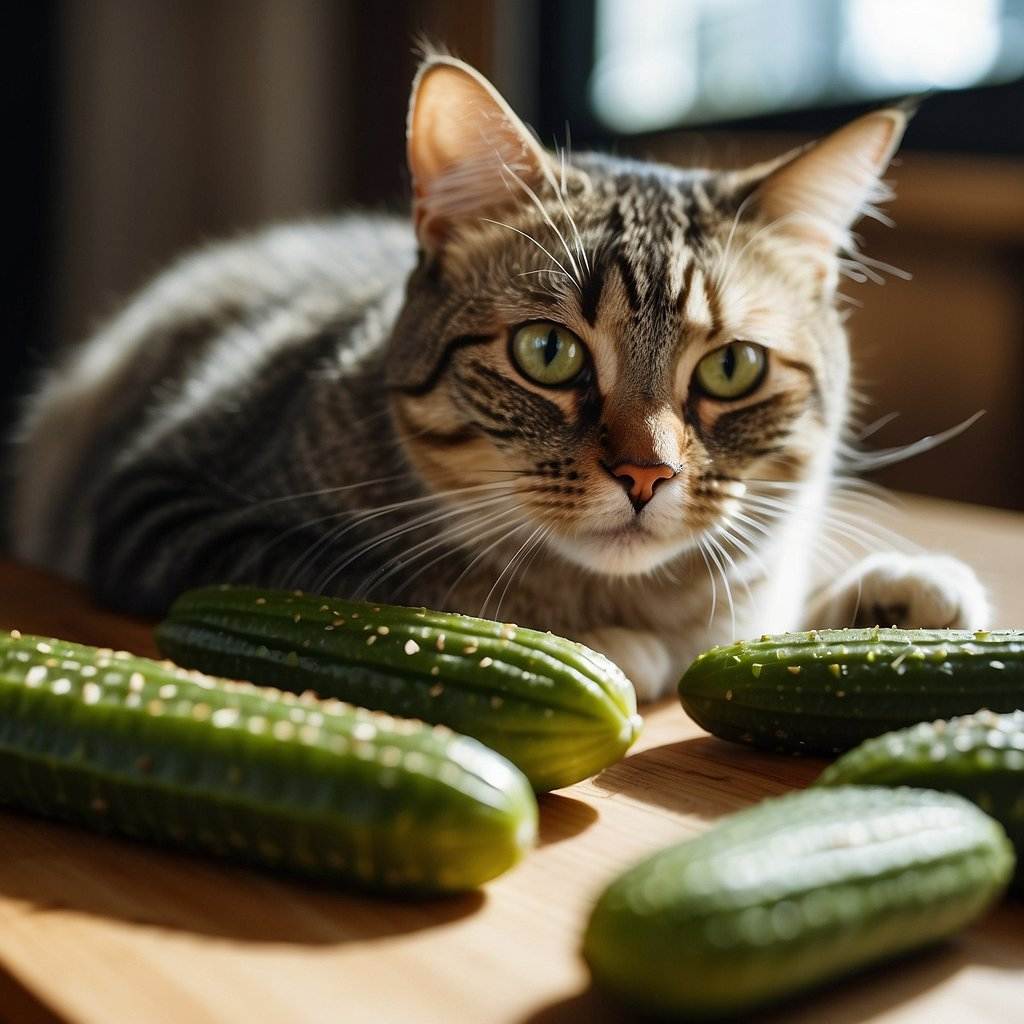
Let’s talk about what’s lurking in those pickled cucumbers.
Sodium Content in Pickles
First off, pickles are soaked in salt—and not just a sprinkle. We’re talking about a salt content that could be around 1200-1500 mg per pickle!
That’s a lot, especially when you consider that cats should only have 21 mg of sodium, including a small amount of sodium, per day. So, why do we make a fuss about it?
Well, too much salt can lead to dehydration in cats, and in some cases, may cause more severe issues such as kidney problems. A tiny lick might not send your kitty to the vet, but a whole pickle?
That’s risky for cats who have sensitive stomachs; in severe cases, excessive salt can be fatal..
Table: Daily Sodium Limits
| Creature | Sodium Limit |
| Humans | 2300 mg |
| Cats | 21 mg |
Other Ingredients in Pickles
It’s not just the salt that’s the villain here. There are other sneaky additives like garlic and certain spices, which can be outright toxic to cats.
Garlic, even in small amounts, can cause anemia in cats, and spicy condiments could upset their stomach, leading to gastrointestinal issues.
List of Not-so-Cat-Friendly Additives:
- Garlic
- Onion
- Chillies
- Excessive Vinegar
Every time you’re munching on a pickle and your kitty gives you the “please may I have some” eyes, remember that they’re better off without it.
Always keep their nutritional needs in mind, and when in doubt, stick to cat-safe treats!
Exclusive Focus on Cats
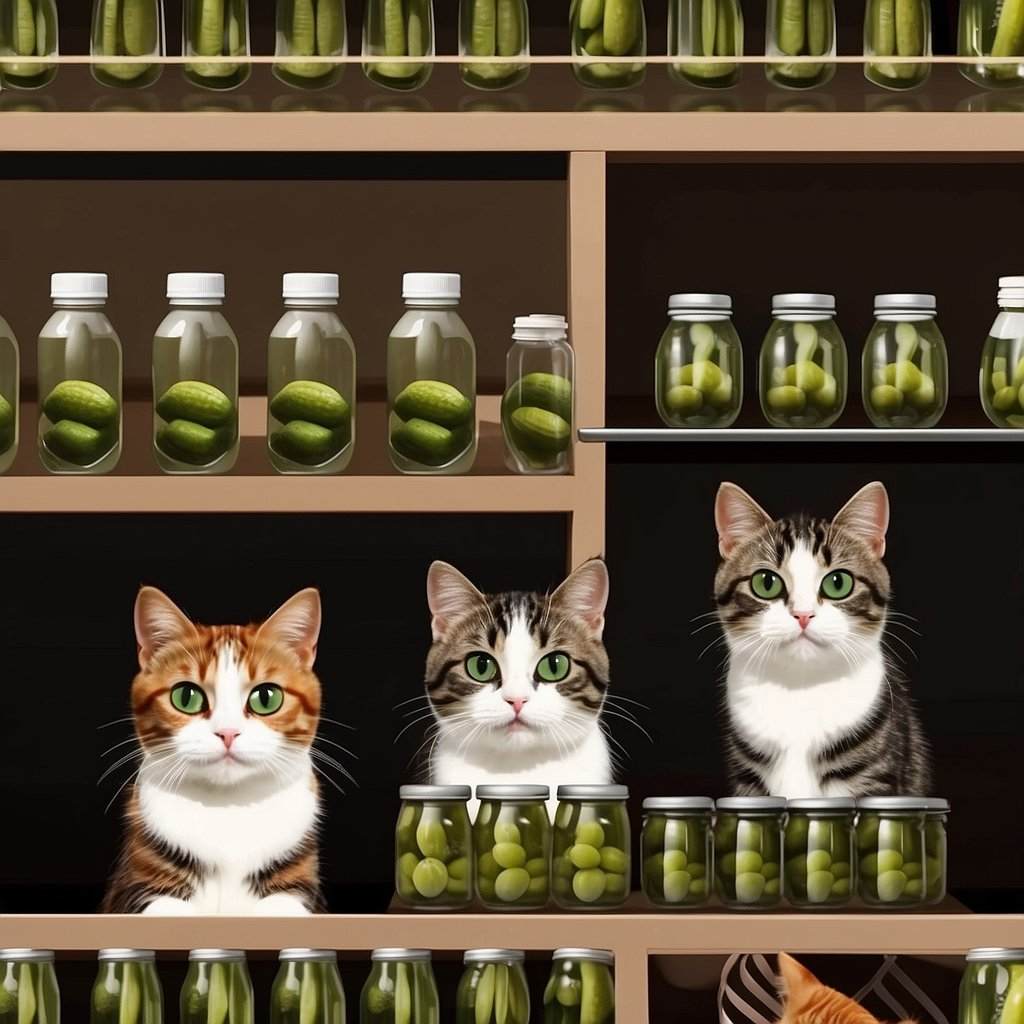
Ever wondered what’s best to feed your whiskered companion? Cats have specific dietary needs that are quite different from dogs. Let’s chow down on some feline-feeding facts!
Cats are obligate carnivores. What does that mean for your furball? Protein, protein, and more protein! Their bodies are fine-tuned machines that thrive on a meat-based diet.
High in protein and low in carbohydrates – that’s your kitty’s meal ticket to health. (4)
Unlike our canine friends who can enjoy a more varied diet, cats need that protein punch to maintain muscle and support a healthy immune system. There’s not much benefit to adding vegetables to their dishes.
Here’s a quick breakdown:
- High-Protein: Essential for growth and repair.
- Low-Carbohydrate: Cats lack significant amounts of the enzyme needed to process carbs.
- Amino Acids: Especially taurine, which is found only in animal tissue.
- Fatty acids: Arachidonic and linoleic acid must be sourced from food.
- Vitamins: Such as A and D, which they cannot produce on their own.
And while we’re on the topic, let’s tackle the pickle situation. Are they part of this carnivore-concocted recipe? No sir-ee.
You might think, “But pickles are just cucumbers, and those are harmless, right?” True, yet the pickling brigade marches in with a cargo of salt and spices that are no-nos for your cat.
Salt toxicity can sneak up on your cat with just a few licks of a pickle.
So, stay on the safe side. Keep the pickled treats to yourself and stick to a vet-approved diet for your kitty. After all, you want your furry friend purring with health, not puzzling over pickles!
Health Implications of Feeding Pickles to Cats
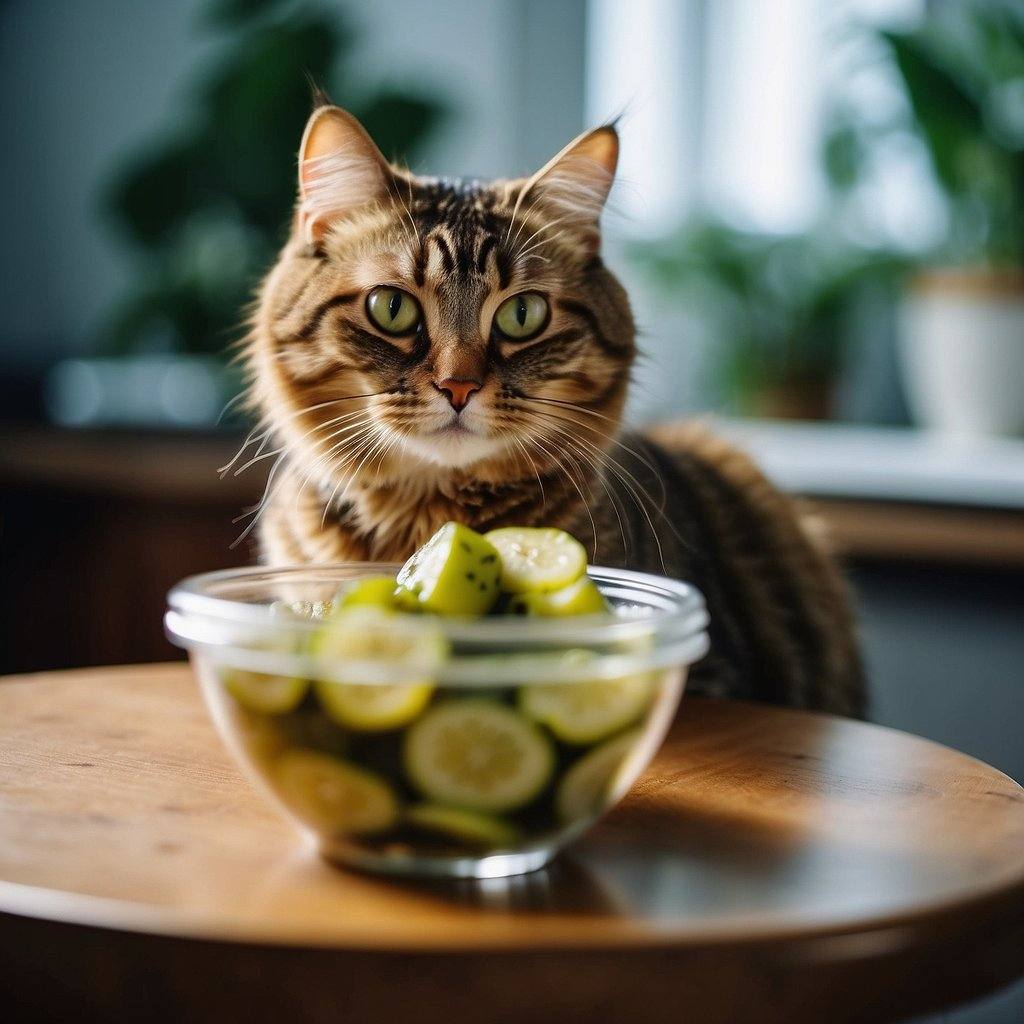
Well, before you toss a pickle their way, let’s chat about why this snack can be more trouble than it’s worth for your kitty.
Risks of Garlic and Other Toxins:
Pickles often contain garlic and onions—flavors we humans relish—but for cats, these can be downright dangerous. If your feline ingests garlic, some tell-tale symptoms may pop up, including:
- Lethargy
- Digestive issues like upset stomach and vomiting
Even a small amount of these ingredients can lead to a condition known as hemolytic anemia. No robust statistics readily pinpoint how often garlic poisoning happens, but it’s a risk not worth taking. (5)
Long-term Health Concerns:
Do you know how a balanced diet keeps us feeling our best? The same goes for cats. An inappropriate diet, a category in which pickles fall, can lead to some serious chronic conditions for your kitty over time.
Let’s break it down real quick:
- High sodium content: Pickles are loaded with salt, which can cause dehydration and electrolyte imbalances. I’m talking about a whole ocean of salt that their tiny bodies just can’t handle.
- Upset stomach and more: Snacking on pickles might lead to an upset stomach, diarrhea, and possibly even salt toxicity.
So, while pickles aren’t classified as toxic to cats, they’re certainly not a treat suitable for your furry friend.
Stick to cat-approved treats that keep tails wagging and purring aplenty, steering clear of those dill delights for your kitty’s dining pleasure.
Real-life Experiences and Anecdotes
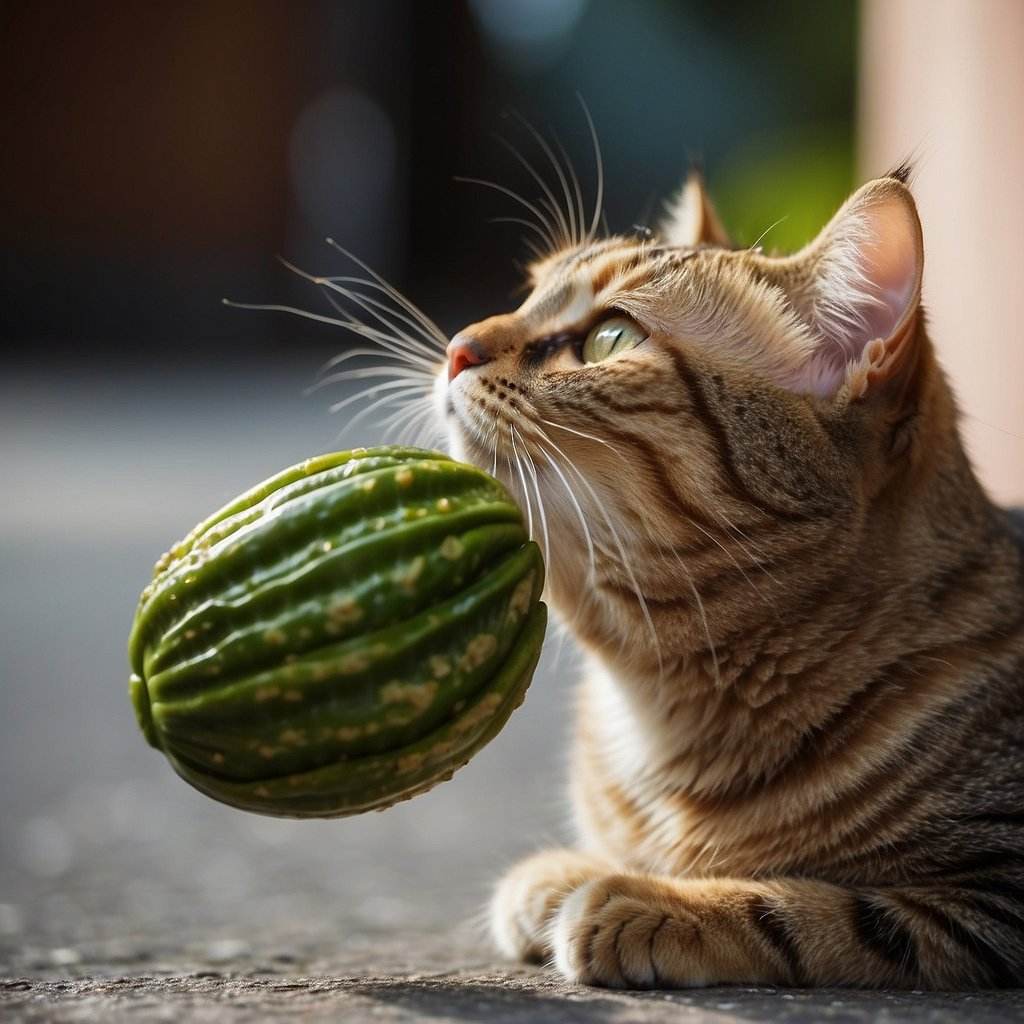
Cats can be quite mischievous, and sometimes their curiosity about our food leads to some interesting stories.
Let’s look at what some cat owners have shared:
The Curious Kitty:
One cat owner reported their feline friend sneakily nibbled on a pickle slice left unguarded on the plate. The cat seemed to enjoy the crunchy bite initially but lost interest quickly, probably overwhelmed by the tangy taste. Fortunately for them, no adverse reactions were observed—a small blessing in disguise!
Salty Surprise:
Another recounts a less fortunate episode where their kitty got more than a lick of pickle juice. The poor thing ended up being extra thirsty and slightly out of sorts for the rest of the day. They learned the hard way that consuming excessive amounts of high salt content is a no-go for kitty diets.
Accidental Encounter:
A stray pickle piece accidentally dropped on the floor led to a sniff and lick by a different cat owner’s pet. While there were no immediate effects, it turned into a lesson to be more cautious with food items that could potentially contain hidden nasties like garlic or high salt levels that could harm a cat’s stomach.
In some cases, the cat’s stomach may need to be “washed” to remove the toxins, and symptoms like weakness, lethargy, and pale gums may develop, indicating symptoms of salt poisoning and being toxic in large quantities.
It’s clear that while some cats might initially be intrigued by the novel taste of pickles, the risks and potential health problems, such as stomach ulcers, kidney disease, and bladder stones, make pickles an ill-advised choice for a cat treat.
Remember, every cat is different, and while one may walk away with mere disapproval for pickles, another could have a sensitive reaction.
If you find these anecdotes relatable and have a story of your own to share, join the conversation—though let’s keep our cat pickles out of paw’s reach, shall we?
Always seek veterinary advice if you believe your cat accidentally eats too many pickles and shows signs of gastrointestinal upset or illness.
Safe Dietary Practices for Cats
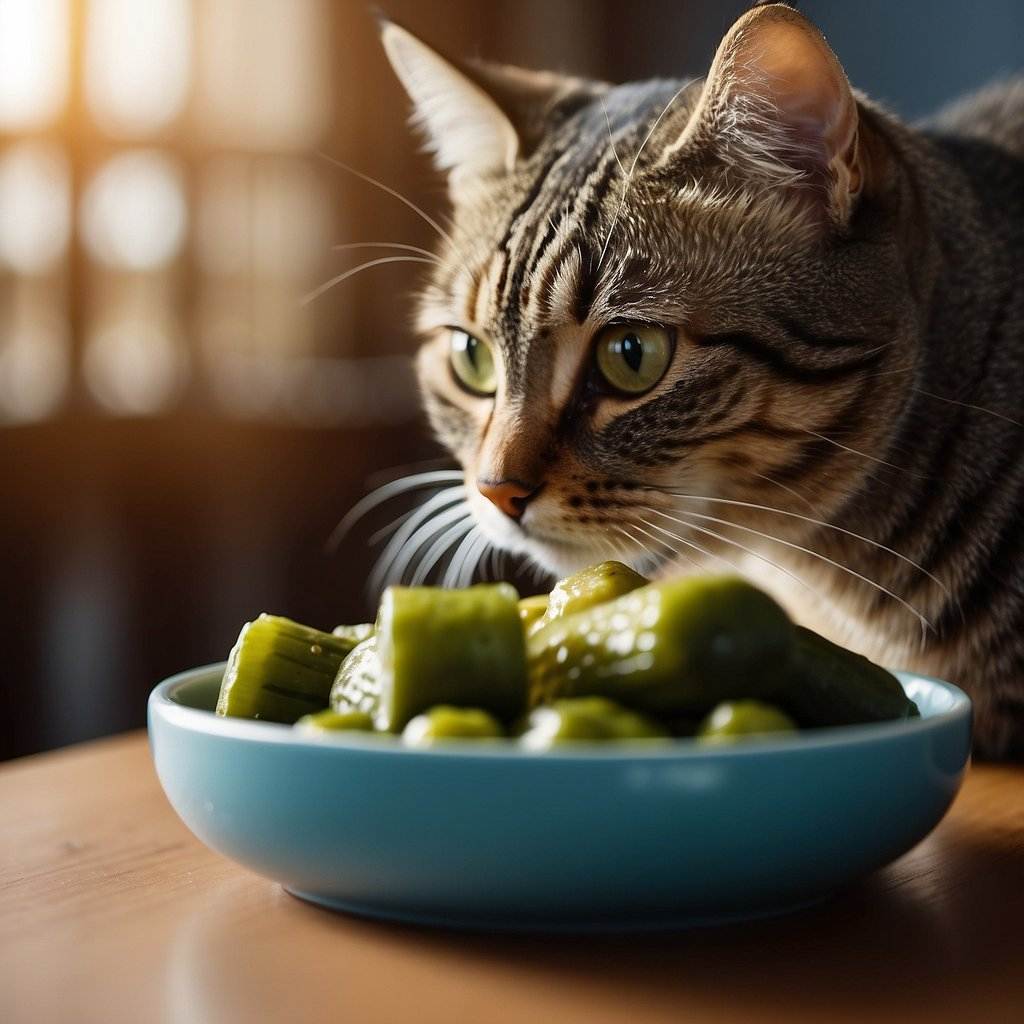
Ever wondered what snack time should look like for your purring pal? While you might be munching on a pickle, your cat’s needs are quite different.
In the quest to provide safe dietary choices for cats, it’s important to understand the risks associated with certain human foods, such as pickles, and to opt for cat-specific treats instead
What’s safe for them to nibble on? And what nutritional benefits should these snacks provide? (6)
Alternative Healthy Snacks for Cats:
- Cooked meats: Your cat’s a carnivore at heart, so small amounts of cooked chicken or turkey can be a treat. These meats are a great source of protein!
- Certain Vegetables: Although not all cats are fans, some may enjoy bits of steamed carrots or broccoli. These veggies can add fiber and vitamins to their diet.
Here’s a quick nutritional checklist for your cat’s snacks:
| Nutrient | Benefit for Cats | Safe Sources |
| Protein | Muscle health | Chicken, Turkey |
| Fiber | Digestive health | Carrots, Broccoli |
| Vitamins | Overall well-being | Various vegetables |
Understanding Feline Nutrition:
When choosing snacks, remember that cats require a balance of certain nutrients. Experts recommend a diet high in protein and low in carbs. But what about random treats?
Think: Are these safe and beneficial for them?
Always avoid foods with excessive salt or ingredients like garlic and onion, which can be toxic. Too much sodium can lead to dehydration and serious health issues.
Quick tips:
- Variety: Introduce new foods slowly to gauge your cat’s interest and tolerance.
- Moderation: Snacks should only be a small part of the diet.
- Hydration: Always ensure fresh water is available to complement their diet.
By keeping your cat’s snacks simple and focused on their natural dietary needs, you’re on the right track. After all, a happy cat means a happy you, doesn’t it? Happy feeding!
Emergency Response
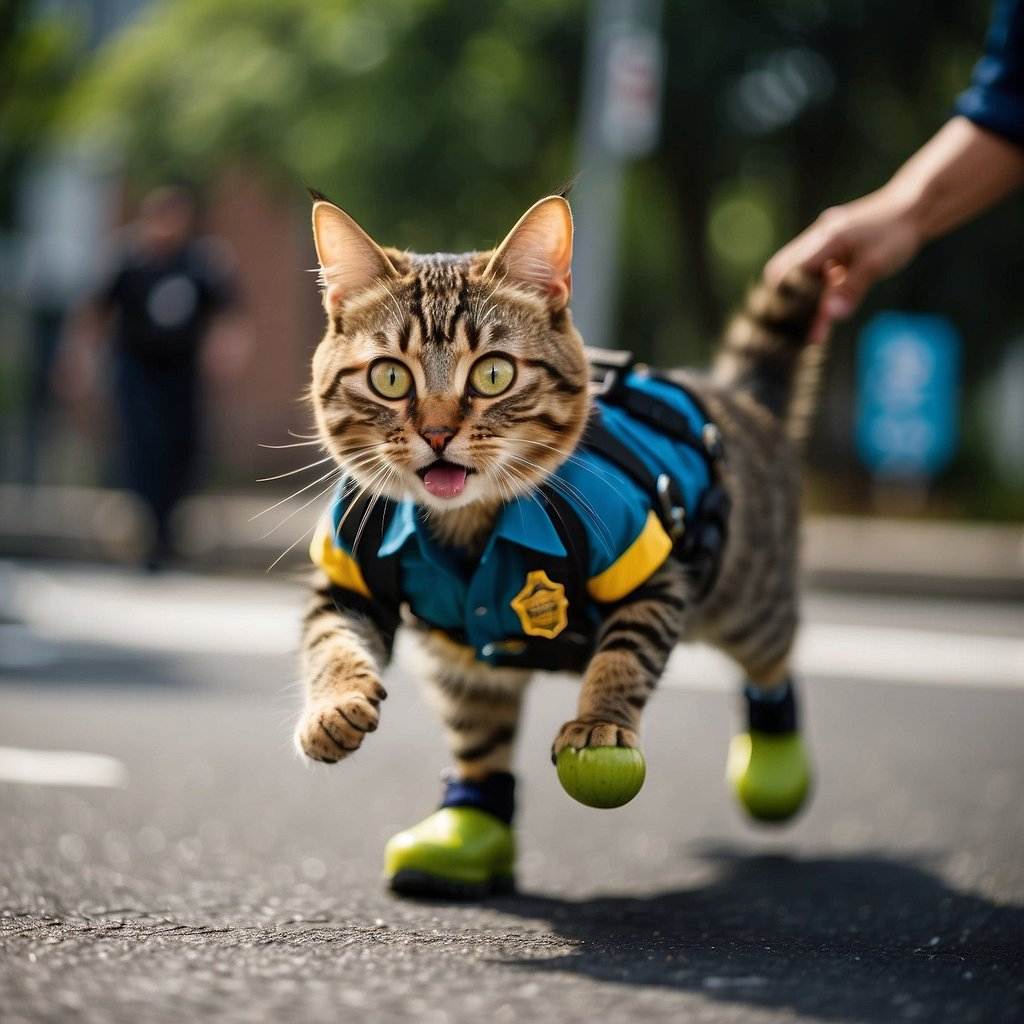
Immediate Actions and Signs to Watch For
Has your curious kitty snagged a pickle off your plate? First things first, don’t panic. Here’s what you can do right away:
- Remove the Pickle: Gently take any remaining pickles away from your cat.
- Observe Your Cat: Keep an eye out for any unusual behavior or symptoms.
Be on the lookout for these signs that something’s amiss:
- Vomiting or Diarrhea: An upset stomach may occur due to pickles’ high salt content.
- Weakness or Collapse: These could signal salt poisoning.
- Seizures: A severe and alarming response to toxic ingredients, like garlic.
If you notice any of these symptoms or if your cat has consumed a large amount of pickles, it’s time for action.
When to Seek Veterinary Care
Wondering whether it’s time to call the vet? Here are some tips to help you decide:
- Mild Symptoms: If symptoms are mild and transient, carefully observe your cat for changes.
- Persistent or Severe Symptoms: If any of the listed symptoms persist or escalate, it’s better to err on the side of caution. Reach out to your vet or an emergency pet clinic.
Remember, you know your furry friend best. Trust your instincts—if something feels off, seeking professional advice is always a good choice.
Keep these key points handy for a quick reference to ensure your kitty stays safe and sound.
Expert Advice and Sources on Can Cats Have Pickles
Have you ever caught your feline friend eyeing a juicy pickle? It’s tempting to think a small bite can’t hurt. But let’s see what the experts say about cats and pickles.
Consultation with Veterinarians
Veterinarian Insight:
- Dr. Jane Smith: “Pickles can be high in sodium and contain spices that are toxic to cats, like onion and garlic.”
- Dr. Alex Doe : “Steer clear of feeding pickles to cats due to potential salt toxicity and harmful seasoning ingredients.”
Expert vets agree: your cat’s health might be at stake with pickles. Always consider their advice before sharing your snacks.
Additional Resources
For the curious cat owners out there, here are some vet-approved resources:
- Books:
- “The Cat Owner’s Manual” – comprehensive care tips.
- “Feeding Your Cat” – explores the do’s and don’ts of cat nutrition.
Remember, snacking with your cat can be fun, but their health comes first. If ever in doubt about what’s safe, ask your vet.
These resources can also offer you a wealth of information to ensure your feline stays happy and healthy!
Quick Recap
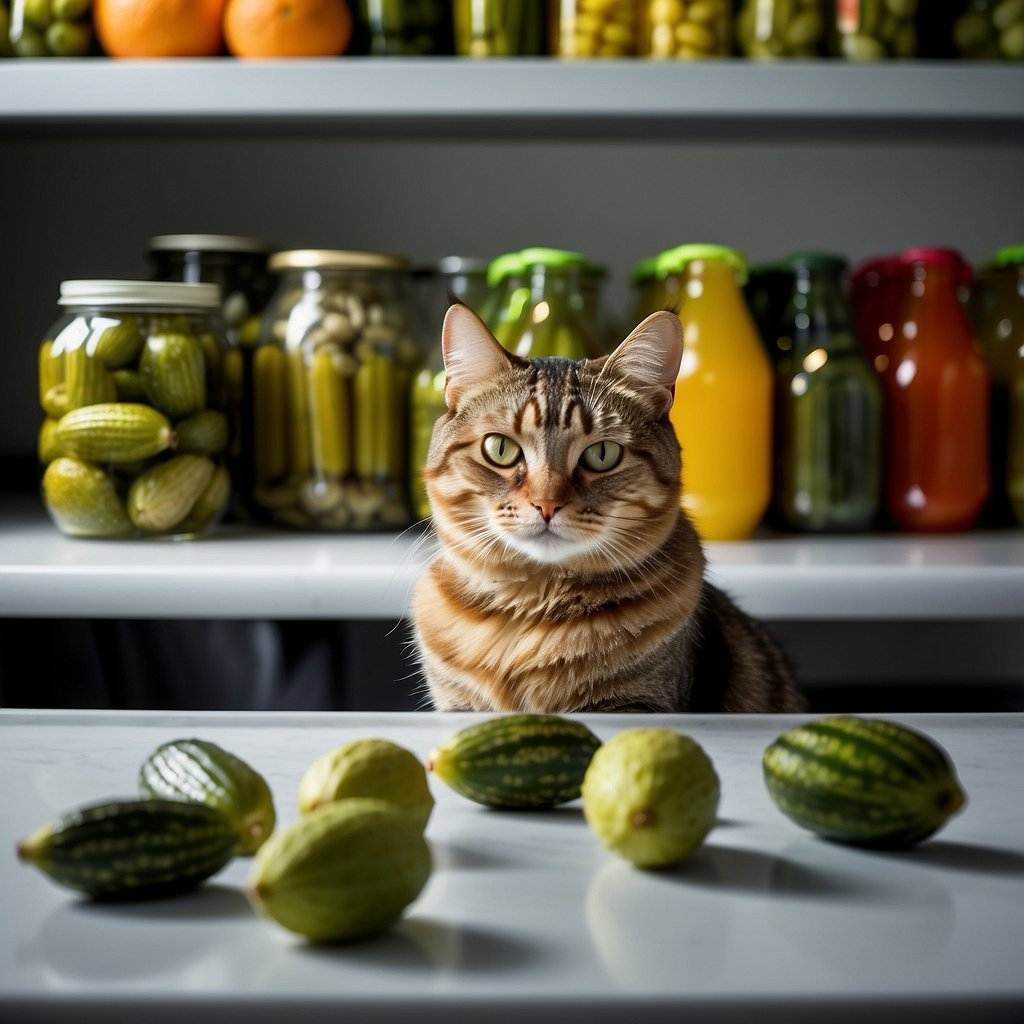
Salt Content: Pickles are super high in salt, which isn’t great for your cat’s health. They can handle only a teeny bit of salt in their diet.
Spices and Herbs: The spices used in pickling—like garlic—could be harmful to your kitty. So, it’s best to steer clear.
Nutritional Value: While pickles do have some vitamins A and C, it’s not all good news. The cons of the sodium and spice content weigh down the pros of these nutrients.
Cucumber vs. Pickle: Just a heads-up, the cucumber itself isn’t the villain here—it’s the pickling process that’s the troublemaker for your cat’s tummy.
| Pros | Cons |
| Vitamins A & C | High salt content |
| Some minerals | Harmful spices |
| Possible health issues from sodium |
Remember, every cat is unique! What’s okay for one may not be for another. So, if your heart’s set on sharing your snacks with your whiskered pal have a quick chat with your vet.
They’ve got the know-how to give advice that’s tailored just for your fuzzy buddy.
There you have it! Keep these snippets of wisdom in mind, and you’ll be on track. Stay informed, stay curious, and here’s to the health of our purr-fect companions!
Frequently Asked Questions
Curiosity may have killed the cat, but when it comes to your feline friend’s diet, it’s better to be safe than sorry. Let’s pounce into some common pickle perplexities that might tickle your curiosity.
Is it safe for my cat to eat pickles, or should these salty snacks be avoided?
Pickles should generally be avoided when it comes to your cat’s diet.
While cucumbers—the main ingredient in pickles—are harmless to felines, the high salt content in pickles can lead to salt toxicity.
My kitty just had a lick of pickle juice – could this cause any harm?
A tiny lick of pickle juice might not cause immediate harm, but it’s not recommended due to its high salt content.
Keep an eye on your kitty for any signs of discomfort or unusual behavior.
Can pickles cause digestive issues in cats?
Yes, the spices and vinegar in pickles can upset your cat’s stomach, leading to problems like vomiting or diarrhea.
The digestive system of cats is sensitive, and pickles are just too harsh for it.
Is cucumber safe for cats since pickles are made from cucumbers?
Absolutely! Cucumbers are safe for cats in moderation and can be a hydrating, low-calorie treat. Just ensure they’re fresh and washed to remove any pesticides.
What should I do if my cat accidentally eats a pickle?
Don’t panic. If your cat nibbles on a pickle, make sure to provide plenty of water and monitor for any signs of distress. If you notice unusual symptoms, contact your vet.
Can pickles cause dehydration in cats?
Indeed, the high sodium content in pickles can increase the risk of dehydration in cats.
So, it’s wise to make sure your whiskered pal always has access to fresh water, especially if a pickle mishap occurs.
Can kittens eat pickles?
Kittens should not eat pickles. Their bodies are even less equipped to handle the high salt content and seasonings that pickles contain.
Stick to kitten-formulated foods for these little ones.
- Advantages of Playing Casino Online - July 6, 2025
- How players can take advantage of the no deposit bonus at the Casino - July 5, 2025

